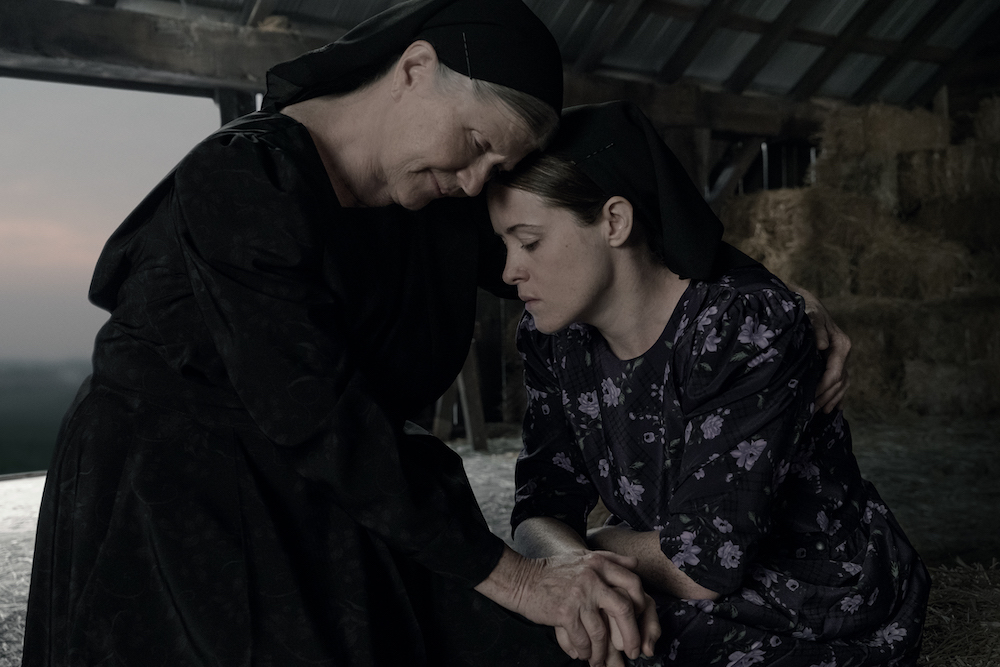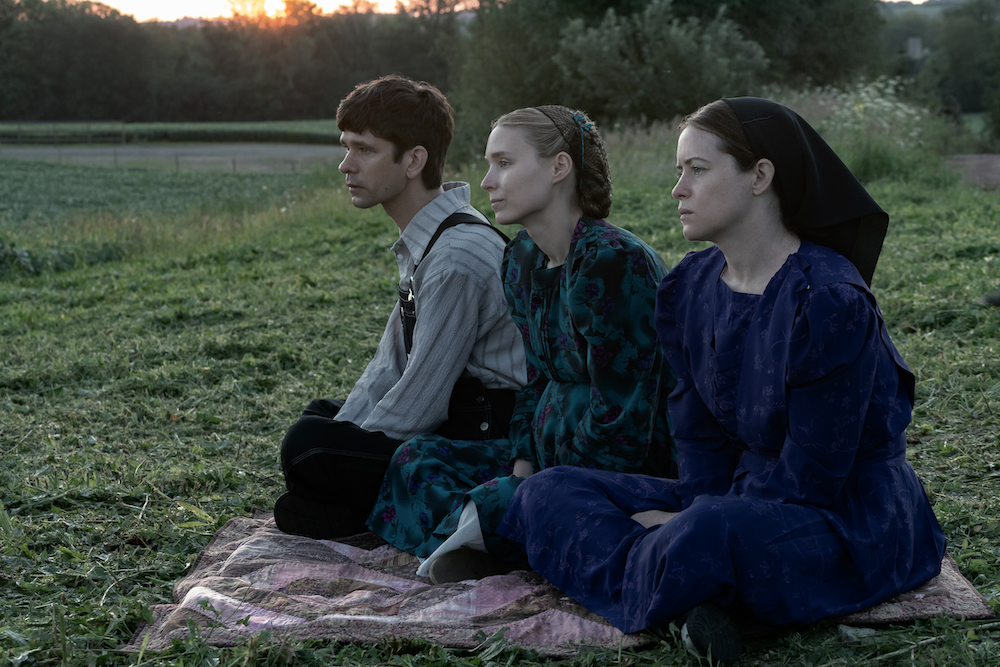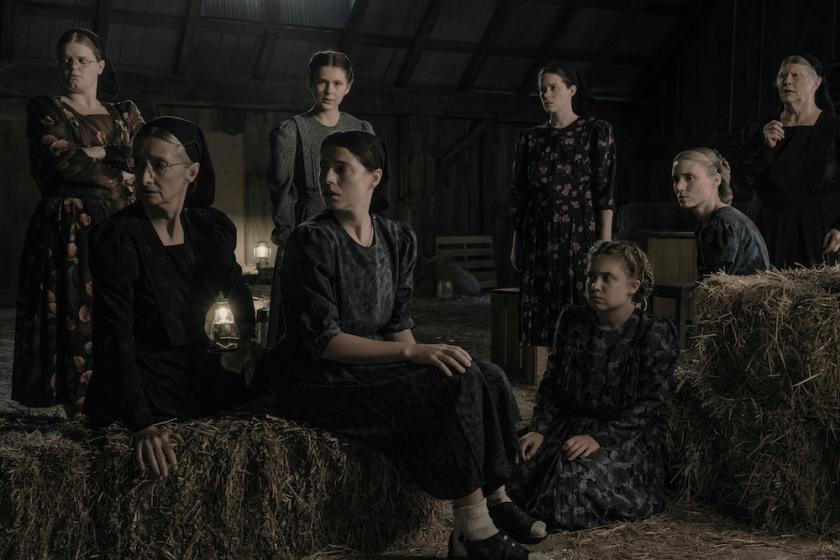Women Talking is very powerful. It was adapted by writer-director Sarah Polley from the novel that Miriam Toews, raised a Mennonite in Canada, based on terrible events that took place in an isolated Mennonite community in Bolivia between 2005 and 2009.
The book can be slow-going at times. But the film – shot by cinematographer Luc Montpellier in muted, desaturated tones, with a cast that includes Rooney Mara, Claire Foy, Jessie Buckley, Ben Whishaw, and Frances McDormand in a cameo role – is moving, vibrant, and compelling.
At first glance, it might seem an unpromisingly static set-up, in danger of speechifying, but Polley’s direction manages to avoid these pitfalls. In 2010, a group of women from two Mennonite families have gathered in a hayloft to debate a momentous decision. Should they leave the community, stay and fight, or do nothing and forgive the men who’ve been raping them and some of their children at night?
The men drugged them beforehand with an animal tranquilliser spray so they remember nothing the next day. They told them that the blood, injuries and, in some cases, pregnancies were the work of ghosts or Satan. And until one woman catches a perpetrator, they believed the men. None of the violence is shown. “There was no language for it. In the gaping silence was the real horror.”
 One of older women, melancholy Greta (Judith Ivey, pictured above with Claire Foy), who is devoted to her two horses and, to everyone’s annoyance, likes telling cute, moralising stories about them, has painful false teeth that are too big for her mouth. Her real teeth were knocked out by her attacker.
One of older women, melancholy Greta (Judith Ivey, pictured above with Claire Foy), who is devoted to her two horses and, to everyone’s annoyance, likes telling cute, moralising stories about them, has painful false teeth that are too big for her mouth. Her real teeth were knocked out by her attacker.
Another woman (played by the non-binary actor August Winter) was probably raped by her brother. She decides, after a miscarriage, never to speak again except to children, changes her name to Melvin, and dresses as a man.
Now silence has been broken. The eight rapists are in jail, but not for long, as the other men have gone to town to post bail. The women have only two days to decide what path to take and how to organise their future. Unlike the men, they've been denied an education and are not only illiterate but know nothing of the world. However, their arguments are sophisticated and articulate, which sometimes does stretch credibility.
The choice lies between leaving – to go where? – or staying and fighting, as doing nothing has mainly been rejected by the colony, though not by Scarface Janz (a grim Frances McDormand) who doesn’t take part in the debate. Can they reach an agreement, listen to each other, shift positions?
Salome (rhymes with home), who is played brilliantly by Claire Foy, has already tried to take matters into her own hands, attacking one of the men with a scythe. Her four-year-old daughter Miep was raped. Heartbreakingly, we see Salome walking for a day and half with Miep on her back to get her antibiotics from a mobile clinic. Forgiveness, though a guaranteed way of entering the kingdom of heaven, is not an option for Salome. “I’ll become a murderer if I stay,” she realises eventually (also not great in the eyes of the Lord).
 Taking the minutes of the meeting is a kind, shy young man, August Epp (Ben Whishaw, pictured above with Rooney Mara and Claire Foy), who's prone to tears and thoughts of suicide. August's parents were excommunicated and expelled years before, but he has returned from England to help educate the boys. He transcribes what the women say and occasionally offers an opinion.
Taking the minutes of the meeting is a kind, shy young man, August Epp (Ben Whishaw, pictured above with Rooney Mara and Claire Foy), who's prone to tears and thoughts of suicide. August's parents were excommunicated and expelled years before, but he has returned from England to help educate the boys. He transcribes what the women say and occasionally offers an opinion.
He is sometimes shouted down, though his carefully considered – and movingly delivered – response to the women's question of whether boys of 13 and 14 should be allowed to leave with them is appreciated and acted on. The women deem that these boys, though sexually inquisitive creatures with little impulse control, are capable of relearning their roles as males.
In the book, August tells the story. In the movie – a change that makes total sense – the narrator is Autje (Kate Hallett), the 16-year-old daughter of Mariche (an excellent Jessie Buckley), whose husband is horribly violent. Though beaten down and bitter, Mariche is unwilling to leave him, resenting the other women for thinking they know better. Autje tells the story to the unborn child of Ona (Rooney Mara), the free spirit August is in love with and who was impregnated through rape. Unlike Mariche, Ona's not bitter and says she already loves the baby deeply.
Polley filmed her fourth feature (which follows Away from Her, Take this Waltz and Stories We Tell) in southern Ontario, with beautiful exterior shots of fields in a flat landscape. The long-sleeved dresses, designed by Quita Alfred, have the oversized, floral feel of items from a Toast catalogue.
Autje and her friend Neitje (Liv McNeil) provide light relief, braiding their hair together and giggling about how very boring the proceedings are. "It's 'fuck off'", Neitje corrects Mariche when she tells Ona to "fuck it off". The outside world thus makes an appearance. It does so again when a census truck suddenly arrives and the community is asked to come out and be counted as it blasts the Monkees’ "Daydream Believer" from its loudspeakers. (In the book the Mamas & the Papas’ sadder "California Dreamin’" is the song in question). Daringly, Autje and Neitje run out to listen to the music – so alien the concept of a homecoming queen – and even talk to the driver.
But it’s Ona’s transcendant lightness of spirit and optimism, as well as her complex reasoning powers, that shine through. As she says, “Thinking is one of the things we want to be free to do.” And, with the hum of #MeToo below the surface, Women Talking shows us how these Mennonite women arrive at that possibility.















Add comment